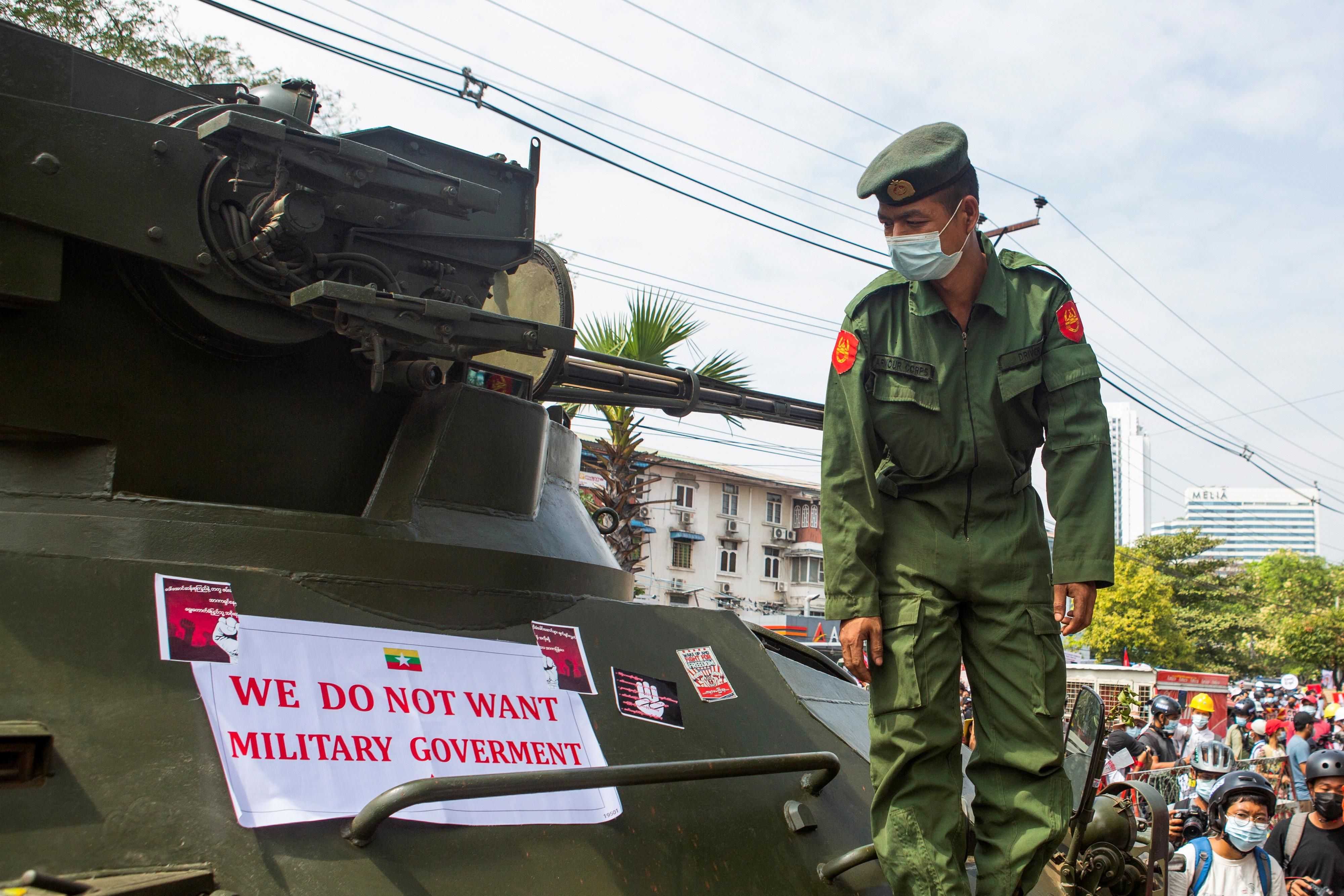Remember Myanmar? It's been over five months since the military — the Tatmadaw — seized power in a coup, sidelining the quasi-democratic civilian government led by former human rights icon Aung San Suu Kyi. Anti-coup demonstrations quickly arose around the country, and the Tatmadaw tried to put them down just as swiftly, responding with brutal violence that killed over 800 civilians.
And although the media has largely moved on, the situation is getting worse in ways that aren't only bad for Myanmar's people, but also for its neighbors.
The economy is taking a huge hit, with the banking sector on the brink of collapse. The provision of many social services, like vaccines (not only for COVID, but also for polio and tuberculosis), has all but stopped. The Tatmadaw continues to face widespread resistance from democracy activists and ethnic militias, and foreign powers like China and the US have done little to bring stability to Myanmar.
Beijing, for its part, has had historically poor relations with the Tatmadaw but is now reluctantly supporting the junta to protect Chinese interests in the country. Washington, on the other hand, is firmly anti-junta but refusing to engage it — Washington seems unwilling to do anything except impose sanctions while putting out press releases about the "restoration of democracy." None of this will bring the country of 55 million back from the brink.
The reluctance of outside players to do more is short-sighted. Because as much as the junta has made life miserable for the people of Myanmar, the country that straddles the invisible border between South and Southeast Asia is also at risk of becoming a huge problem for its neighbors.
One of the biggest issues is that the junta, for all its repression, can't control the whole country. And that's not new. Myanmar is, as historian Thant Myint-U has written, "a colonial creation" comprising various regions with different ethnic groups who were never effectively integrated into a unified state. In fact, since its founding in 1948, no single government has controlled the entire territory of Myanmar, with several armed ethnic minority groups fighting for their self-determination in what remains the world's longest-running civil war. Chief among them are the Rohingya, a Muslim ethnic group living in Rakhine state whom the Tatmadaw has since 2017 violently persecuted in what looks like genocide.
Myanmar's restive ethnic patchwork is both a blessing and a curse for the Tatmadaw. The junta can't control the whole country, but at the same time, anti-Tatmadaw factions are likely too divided to unite and bring them down. Indeed, as we saw in recent months, a number of ethnic groups condemned the coup, but only a few have actively fought back against it, with most instead working to advance their own interests.
To be clear, Myanmar is not a "failed state" like, say Somalia, where the central government barely exists and can't provide basic services or meet vital needs at all.
But the outlook is nonetheless bleak — because while the Tatmadaw controls just enough of Myanmar to prevent regime change, it doesn't control enough to contain the risk of instability to its neighbors. This risk can take several forms.
First, as the economy collapses and people suffer, losing access to whatever services they may once have had, Myanmar could soon become a major source of refugees. Already, thousands have fled into Thailand (which turned some of them back) and India. China closed its border and sent troops to defend it. But more refugees are likely.
And with them comes a responsibility for which few South and Southeast Asian countries are prepared. Just as Syrian refugees inflamed tensions in the Middle East, with countries like Lebanon and Jordan struggling to integrate this influx into their own populations, Myanmar's refugees will pose economic and social challenges to its neighbors as well.
Additionally, there is the threat of illicit and criminal activity gaining a larger foothold in Myanmar. As the rule of law further breaks down, illicit businesses — like methamphetamine production, which was a massive problem in Myanmar before the coup, and wildlife smuggling — will increase. Drug trafficking and criminality of this kind have a way of bleeding across borders fast.
Lastly, there is a real, if limited, potential for greater Islamist extremism taking root in the country. Myanmar, particularly Rakhine, is home to a small number of weak Islamist groups — including the Arakan Rohingya Salvation Army — that have in recent years attracted a smattering of foreign fighters and committed heinous violence against Hindu and Buddhist civilians. They could use the ongoing crisis to bolster recruitment both from Myanmar and from further afield, just as the Islamist insurgency in the Philippines brought fighters from Pakistan, Bangladesh, and the Middle East. Powerful Islamist groups such as Pakistan's Lashkar-e-Taiba and al-Qaeda in the Indian subcontinent have already identified the Rohingya as a cause célèbre.
Even a limited uptick in extremism would pose a risk to surrounding countries, particularly Bangladesh, which borders Rakhine. But the shockwaves could be felt further afield. Former Malaysian Prime Minister Najib Razak once warned that Rakhine could be a "fertile ground for radicalization and recruitment by [the Islamic State] and affiliated groups" and thus constitutes a "serious security threat to the region." The coup has only augmented that problem.
And yet, even with all these potentially nasty risks growing, foreign powers seem unwilling to act — that is, by actually engaging the junta (which the US has so far refused to), and pushing it into some power-sharing agreement.
But with China narrowly focused on its own self-interest, and the US boxed in by its commitment to "restoring" democracy in Myanmar, there is, at the moment, little reason to be hopeful, either for Myanmar or for its neighbors.
Charles Dunst is an associate with Eurasia Group's Global Macro practice
